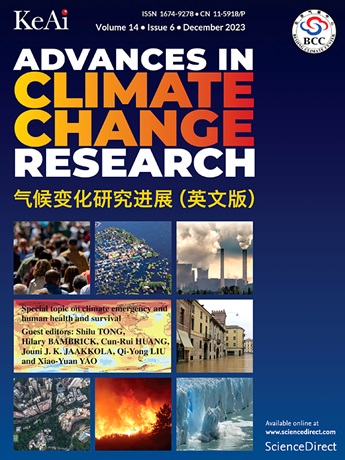Cognitive decline in relation to later-life high temperature exposure in a Chinese nationwide cohort
IF 6.4
1区 地球科学
Q1 ENVIRONMENTAL SCIENCES
引用次数: 0
Abstract
Growing evidence has linked extreme temperature with neuropsychiatric disorders under climate warming with frequent extreme heat events over the past decades, while cognitive performance in relation to heat exposure remains largely unstudied, particularly in populations at high vulnerability to climate risks (e.g., China). Based on five survey waves of a nationwide dynamic cohort (2011–2020), we analyzed 47,825 cognitive test records from 14,729 respondents aged 45+ years across 126 Chinese cities. Global cognitive performance and its two dimensions (episodic memory and mental status) was measured using standardized questionnaires. Temperature exposure prior to cognitive tests was assessed using both average temperatures and heat days exceeding predefined temperature thresholds. Linear mixed-effects models were utilized to examine the relationship between high temperature exposure and cognitive function. This study revealed consistent evidence for heat-related declines in global cognitive performance and episodic memory across multiple exposure-window analyses, while robust associations were observed solely during prolonged exposure periods (more than 90 d) for mental status. For each 1-°C rise in annual mean temperature within 1 year prior to investigation, cognitive scores declined by 0.058 (95% CI: −0.079, −0.037) points for global performance, 0.033 (95% CI: −0.048, −0.018) points for episodic memory, and 0.025 (95% CI: −0.038, −0.013) points for mental status, respectively. Similar findings were seen in analyses using heat exposure days defined by multiple temperature percentiles, linking per 10-d increase in heat duration to reduced global cognitive scores ranging from −0.142 (95% CI: −0.214, −0.070) to −0.168 (95% CI: −0.254, −0.082). Despite varied evidence by heat exposure metrics and cognitive dimensions, stratified analyses suggested possibly higher susceptibility among females, less-educated, and urban-dwelling residents to heat-related cognitive impairment. These results provided suggestive evidence for the role of exposure to heat in triggering cognitive impairment in middle-aged and older individuals. This finding may be crucial in developing public health strategies for managing climate change risks of neurobehavioral disorders in a healthy aging society.
在中国全国范围内,认知能力下降与晚年高温暴露有关
越来越多的证据表明,在过去几十年气候变暖和极端高温事件频发的情况下,极端温度与神经精神疾病有关,而与热暴露有关的认知表现在很大程度上仍未得到研究,特别是在易受气候风险影响的人群中(如中国)。基于全国动态队列(2011-2020)的五次调查浪潮,我们分析了来自中国126个城市的14729名45岁以上受访者的47,825份认知测试记录。采用标准化问卷对全球认知表现及其两个维度(情景记忆和精神状态)进行测量。使用平均温度和超过预定温度阈值的热天来评估认知测试前的温度暴露。使用线性混合效应模型来检验高温暴露与认知功能之间的关系。该研究通过多个暴露窗口分析揭示了与热相关的全球认知表现和情景记忆下降的一致证据,而仅在长时间暴露(超过90天)的精神状态中观察到强有力的关联。调查前1年内,年平均气温每上升1°C,整体表现的认知得分分别下降0.058 (95% CI: - 0.079, - 0.037)分,情节记忆的认知得分下降0.033 (95% CI: - 0.048, - 0.018)分,精神状态的认知得分分别下降0.025 (95% CI: - 0.038, - 0.013)分。在使用多个温度百分位数定义的热暴露天数的分析中也发现了类似的结果,每增加10天的热暴露时间,全球认知得分就会下降,范围从- 0.142 (95% CI: - 0.214, - 0.070)到- 0.168 (95% CI: - 0.254, - 0.082)。尽管热暴露指标和认知维度的证据不同,但分层分析表明,女性、受教育程度较低和城市居民对热相关认知障碍的易感性可能更高。这些结果为暴露在高温下引发中老年人认知障碍的作用提供了启发性证据。这一发现可能对制定公共卫生战略以管理健康老龄化社会中神经行为障碍的气候变化风险至关重要。
本文章由计算机程序翻译,如有差异,请以英文原文为准。
求助全文
约1分钟内获得全文
求助全文
来源期刊

Advances in Climate Change Research
Earth and Planetary Sciences-Atmospheric Science
CiteScore
9.80
自引率
4.10%
发文量
424
审稿时长
107 days
期刊介绍:
Advances in Climate Change Research publishes scientific research and analyses on climate change and the interactions of climate change with society. This journal encompasses basic science and economic, social, and policy research, including studies on mitigation and adaptation to climate change.
Advances in Climate Change Research attempts to promote research in climate change and provide an impetus for the application of research achievements in numerous aspects, such as socioeconomic sustainable development, responses to the adaptation and mitigation of climate change, diplomatic negotiations of climate and environment policies, and the protection and exploitation of natural resources.
 求助内容:
求助内容: 应助结果提醒方式:
应助结果提醒方式:


